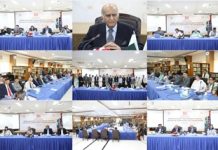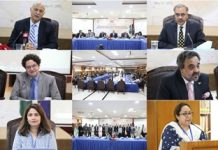We have slowly fallen back into the conventional trap of immoral politics. General Musharraf’s political actions, from rigging the presidential election to sending the chief justice of Pakistan on ‘forced leave’, have no moral justification
Two opposite views have dominated the theory and practice of politics, the oldest game of power in human history. The first and most widely accepted view today is the moral one. Attaching morality to politics may sound absurd and irrelevant to our situation, but the modernist understanding of politics is that it has a moral foundation, which dignifies it and makes it a vehicle for defending public interest, serving the people and pursing the common good of the community.
What is moral about politics, and why do Pakistan and other Muslim countries need to revisit the fundamentals of their political processes?
Politics is about acquiring, retaining and exercising power, but that has to be done within the limits of law and Constitution. The Constitution forces a government to function within its limits and restrains rulers from exercising arbitrary power. The superior courts are the guardians of the Constitution and have a moral and legal responsibility to oversee that the other branches of the government, executive and the legislature, don’t transgress constitutional limits.
This discussion will not be complete without mentioning that the source of legitimate authority in modern states is the citizenry, or popular sovereignty. The two conditions of constitutionalism and popular sovereignty make politics and the exercise of power moral and ethical. Morality here implies that the power of rulers is widely respected, people have ownership of the government, and they see in the exercise of power a manifestation of their own will and translation of their own interests.
The other view is the Machiavellian one, which holds that politics have a morality of their own, which shouldn’t be judged by the common standards of morality prevailing in society. Although Machiavelli wrote nearly four hundred and seventy-five years ago, his advice to the prince, that acquisition and effective use of power may require unethical and unconstitutional methods, has been embraced as timeless truth by many leaders here and elsewhere, in developed as well as developing countries. Modern-day spin-doctors would term pursuit of power by all means necessary as political pragmatism.
The immoral politics of ‘ends justify the means’ in our history have done no good to the country, to our people or to our nationhood. Before I turn to the current situation and where it is likely to lead us, let me remind you of the consistency of this theme amongst our civilian and military rulers and the dark times we have had to endure when they departed the national scene. Ayub Khan presented himself as a modernist, an image that is justified in the light of what he did in the vital areas of economy and social development. But the means he adopted, like abrogation of the first consensual Constitution, imposition of martial law, destruction of judiciary, political parties, and rigging of elections were immoral and finally his rule ended up fragmenting the country.
General Zia ul-Haq had different objectives. Liberation of Afghanistan and Islamisation of the country dominated his eleven years of perpetual uncertainty and political confusion. The means he used were the same that Ayub Khan did. Consequently, Pakistan lost yet another crucial decade in developing itself as a modern nation-state. Apparently he stepped in to pull the country out of the deep political crisis, but ended up generating deeper crises of identity and institutional decline. The ethnic and political polarisation that his regime created and fomented continues to trouble our state and society even today.
We have had a fourth military ruler, General Pervez Musharraf, firmly in power for more than seven years. What was his reason for capturing the state and imposing military rule? The elected prime minister removed him from his position as the Chief of Army Staff in a disgraceful manner while he was on his way back to the country. True, Prime Minister Nawaz Sharif didn’t act in a dignified and civilised manner, but he had constitutional authority to do so. Whether his decision was dictated by fear of his impending removal or by ambition to bring the military under civilian authority, it harmed the fledging democratic process.
Democracy is not about the dictatorship of the majority; nor is it about repressing dissent or diminishing the formal and informal countervailing forces of institutions and society. Pakistan and democracy have paid a heavy price for Mr Sharif’s whimsical, unwise, and confrontational style of politics. Because of these tendencies, he lost the moral basis of his authority even when he retained his ‘heavy mandate’ in the assemblies. He was widely perceived as acting like a dictator.
We must recognise that despite the unconstitutionality of the military’s intervention, the people in general welcomed General Musharraf and the superior court gave him legitimacy, albeit a controversial one, to conduct elections within three years. In the institutional void that our politics have faced for the last three generations, the underlying assumption of the court, civil society and some of the political parties was that he could be a neutral, transitional figure to put democracy back on the rails.
His seven-point reform agenda was widely greeted as bold and visionary, with the potential for bringing about structural reform in the country. Unfortunately the journey from ‘sham democracy’ to ‘true democracy’ has proved to be deceptive. Like Ayub Khan and Zia ul-Haq, General Musharraf believes that a controlled, guided and graduated democracy, with the military as a partner or in the shadows would create political stability, and help modernise the economy and the country. This view comes out stridently in his book In the Line of Fire and is written all over the political landscape he has created and firmly maintained during the past seven years.
We have slowly fallen back into the conventional trap of immoral politics. General Musharraf’s political actions, from rigging the presidential election to sending the chief justice of Pakistan on ‘forced leave’ or impairing him to perform his duties before anything is proved against him, have no moral justification in the terms I have defined above.
The recent events throughout the country indicate a public mood of frustration, anger, and absolute revulsion against the way the General has conducted himself in power. Instead of shaping up things and moving out, he has arrogated an air of indispensability to himself; his staying in power is ‘good for the country’. This is nothing but self-delusion, because history’s final verdict, if one can wait for it to be delivered, has been very bitter on such self-perceptions.
The great support many sections of society, from ordinary folk to celebrated jurists, lawyers, intellectuals and media men and women, have shown for the dignity and independence of judiciary has lifted our failing spirits. Rule of law, democracy, the moral basis of politics and representative government are our old dreams and new aspirations, which have origins in the philosophy of our great founder, Mohammad Ali Jinnah.
The regime and its mouth soldiers have lost touch with political reality. This is why they show hardly any respect for truth or popular sentiment. I don’t think the politics of deception and constitutional wrongs can sell in the age of economic transformations and globalisation of media.
There is a way out of the present crisis, as stressed in the editorial of the Daily Times of March 18, if General Musharraf recaptures his role as a transitional figure in our politics and history. I do trust that he is a modern man, and understands the complexity of our times, the vulnerabilities of our existence, the weakness of his friends and the strengths of his adversaries, and of course, the great sacrifices that the founding generation, including his family and millions of others, made to found the state of Pakistan.
The working ideas of transition are an interim government, an independent and effective election commission and neutrality of state in the electoral process. Before we take the first step in this direction, the honour and the constitutional authority of the Supreme Court needs to be restored, which has been gravely compromised with the ‘suspension’ of the chief justice of Pakistan. In the past we have gained nothing and lost everything by setting institutions on collision course.
The author is a professor of Political Science at the Lahore University of Management Sciences.












